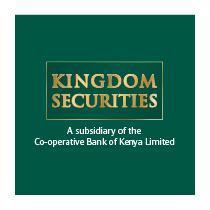Kingdom Securities Limited (KSL) is a subsidiary of the Co-operative Bank of Kenya Limited, the third largest bank in terms of asset base in Kenya. The bank acquired 60% controlling interest in Bob Mathews and is now trading as Kingdom Securities Limited (KSL).
It formally started operations on June 11th 2009 and is supported by a strong distribution network of 162 Co-op Bank branches nationwide. KSL is licensed by the Capital Markets Authority (CMA) under license no 03/09.
Kingdom Bank has shifted to holding Sh7.99 billion worth of government debt securities long-term with the small lender now committing to keep the assets until their maturity. This marks a significant change in the management of the Sh20.9 billion that the lender received from the Central Bank of Kenya to support its turnaround.

Kingdom Bank previously held nearly all the funds in the form of treasuries which it can sell at any time in the market. The institution reported that it split the assets into two – Sh7.99 billion held to maturity and Sh16.5 billion available for sale — in the nine months that ended September.
This was a movement from Sh294.5 million and Sh23.3 billion respectively as of December 2021. The bank has invested its own cash in government debt securities in addition to the CBK funds.
How to buy and sell shares with Kingdom Securities at the NSE
Treasuries held as available for sale give a bank an option to trade the assets for a profit or to manage its liquidity. This classification of securities, however, brings paper gains or losses which show up in “other comprehensive income” of the profit and loss accounts. Debt securities usually generate paper losses when new ones are sold at higher interest rates as is the case now.
Kingdom Bank’s parent firm Co-op Bank earlier said the subsidiary will start deploying more of the CBK funds to increase lending to customers. Kingdom Bank’s loan book rose to Sh5 billion in the nine months that ended September compared to Sh4.2 billion a year earlier. The institution still draws the bulk of its income and profit from returns on fixed-income securities.









